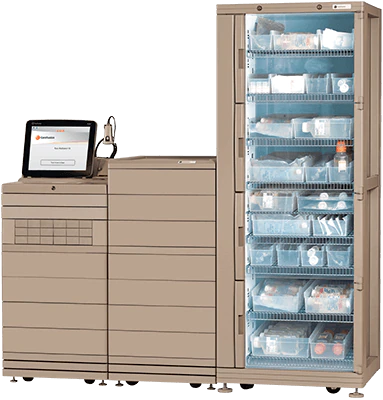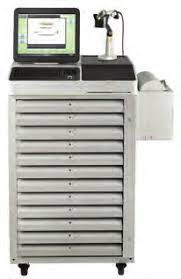
Pharmacy Sterile Compounding
Course Overview
MTINY STERILE COMPOUNDING TRAINING
MTINY’s Sterile Compounding program introduces students to institutional pharmacy practice and prepares Pharmacy Technicians II for the sterile compounding certification exam. The program covers sterile products, aseptic techniques, and sterile facility operations, emphasizing safe and effective practices.
Our Certified Compounded Sterile Preparation Technician program includes expanded training on medication preparation, processing, techniques, documentation, safety, compliance, billing, and emergency management.
Pharmacy technicians play a vital role in ensuring patient safety by upholding clinical standards when preparing, transporting, and distributing medications. A sterile compounding certification equips professionals with the skills to maintain medication safety and prevent contamination.
What is Sterile Compounding Certification?
This certification shows pharmacy technicians have the skills to safely prepare sterile products in clean environments, reducing contamination risks and ensuring patient safety.
Why is it Important?
- Protects Patients: Certified technicians uphold clinical standards, reducing medication-related risks.
- Protects Practices: Certification minimizes errors, malpractice risks, and operational disruptions.
- Career Growth: Employers value certified technicians, increasing job opportunities and earning potential.
- Recognition: Certification demonstrates dedication and earns respect within the field.
MTINY’s program offers hands-on training to prepare students for these benefits while safeguarding their patients and practices.
Tuition & Fees
Course overview
We are still updating our website with contents. Please check back next time.
Program Schedule
SPRING SCHEDULE*
Start Date: 3/12/2025
Expected Graduation Date: 6/20/2025
SUMMER SCHEDULE*
Start Date: 6/4/2025
Expected Graduation Date: 9/15/2025
*Orientation will be held approximately one week prior to the start of the program.
MTI Mission & Goals
The mission of MTI of New York is to offer education in Allied Health for on-demand occupations to members of our community in pursuit of advancing their career path in this employment sector. As such, MTI strives to deliver to its community of learners, opportunities for career advancement, change and expanding industry standards, the optimum delivery of services, which meet and exceed industry expectations, to place graduates at the top of the candidacy pool for positions within their area of choice.
Program Curriculum
| Course Code | Course Title | Hours |
|---|---|---|
| PSC101 | Introduction to Sterile Compounding | 5 |
| PSC102 | Math Calculations for Pharmacy | 15 |
| PSC103 | Medications and Disease Management | 5 |
| PSC104 | Infection Control and Waste Management | 5 |
| PSC105 | Calculations Used in Intravenous Preparations | 20 |
| PSC106 | Medication Administration | 5 |
| PSC107 | Pharmaceutical Compound-Sterile Preparations | 30 |
| PSC108 | The Sterile Environment | 5 |
| PSC109 | Equipment and Supplies | 5 |
| PSC110 | Sterile Practice | 10 |
| PSC111 | Packaging, Labeling, and Documentation of CSPs | 10 |
| PSC112 | Total Parenteral Nutrition | 20 |
| PSC113 | Hazardous Pharmaceuticals | 10 |
| PSC114 | Hazardous Drug Preparation | 30 |
| PSC115 | Radiopharmaceutical—Preparation, Compounding, Dispensing, and Repackaging | 5 |
| PSC116 | Quality Management, Safety, and Patient Compliance | 10 |
| PSC117 | Third-Party Billing, Reimbursement, and Inventory Management | 5 |
| PSC118 | Operations and Emergency Preparedness | 10 |
| PSC119 | Career Development | 5 |
| PSC120 | Pharmacy Internship: Institutional Care | 130 |
| PSC121 | PTCB/ASHP Exam Preparations | 10 |
| TOTAL PROGRAM HOURS | 350 | |
Grading Scale and Methods of Evaluation
| LETTER CODE | INCLUDED IN HOURS EARNED | INCLUDED IN HOURS ATTEMPTED | INCLUDED IN CGPA AND SAP | QUALITY POINTS |
|---|---|---|---|---|
| A = 90 - 100% | Yes | Yes | Yes | 4.00 |
| B = 80 - 89% | Yes | Yes | Yes | 3.00 |
| C = 70 - 79% | Yes | Yes | Yes | 2.00 |
| F = 0 - 69% | No | Yes | Yes | 1.00 |
| AU (audit) | No | No | No | n/a |
| I (incomplete) | No | Yes | No | n/a |
| P (pass) | Yes | Yes | No | n/a |
| PR (proficiency) | Yes | Yes | No | n/a |
| TC (transfer credit) | Yes | Yes | No | n/a |
| W (withdraw) | No | Yes | No | n/a |
| WP (LOA) | No | No | No | n/a |
| NP (not pass) | No | Yes | Yes | n/a |
Admission
GENERAL ADMISSIONS REQUIREMENTS
Prospective students are encouraged to apply for admission as early as possible to secure a place in their desired program and starting date. All applicants are required to complete a personal interview with an admissions representative, which is conducted in person. Guardians or significant others are encouraged to participate in the interview process. This interview helps the institution assess the applicant’s suitability for enrollment.
To complete the enrollment process, applicants must submit the following:
- Application for Admission Form
- Enrollment Agreement
- If under 18 years of age, the Enrollment Agreement must also be signed by a parent or guardian.
- Application Fee Payment
- This fee is non-refundable unless the applicant is denied admission or cancels the application within three days of the institution’s receipt of the application and fee.
- Student and Programmatic Disclosure Forms
- Entrance Exam (if applicable)
- Refer to “Selective Admissions Criteria” for details.
- Request for Official Transcripts
- Required if seeking transfer of previously earned college credit.
- Interview Acknowledgment Form/Student Information Record
The institution reserves the right to deny or rescind an applicant’s eligibility to begin classes if all general and selective admissions requirements are not successfully completed within the required timeframe.
Program-Specific Admission
Admission to one program does not guarantee eligibility for other programs. Applicants wishing to enroll in a different program in the future must independently meet all the requirements for that program at the time of application and undergo the selection process for that program.
Proof of Graduation
Documentation of high school graduation or its equivalent must be provided before the student’s first scheduled class. The student’s responsible for providing valid proof, and additional documentation may be required to verify authenticity. Failure to provide this documentation will result in enrollment cancellation, forfeiture of academic credits earned prior to cancellation
Prospective students must comply with the following admission requirements to enroll:
- Present a Valid picture ID
- Present one of the following:
- High School Diploma
- GED
- an associate or bachelor’s degree official transcript as proof of higher education completion.
- Students enrolling in a program including a clinical component are required to pass the Level 2 Criminal Background Check completed through an MTI of New York third-party.
- To qualify for enrollment, a one-on-one appointment with one of the school admissions’ representatives is needed. During the one-on-one appointment, the admission’s representative will provide advisement services to aid the student in planning and completing the program for enrollment.
- Diplomas and transcripts for education completed in a foreign country must be accompanied by the corresponding official translation and evaluation. For a listing of accepted translators and evaluators visit the National Association of Credential Evaluation Services (NACES) at www.naces.org Our school only accepts translations and evaluations received directly from NACES members, sent directly to our school, and addressed to MTI of New York, attention Admissions Department, 211 East 43rd Street, 2nd Floor, New York, NY 10117.
Selective Admissions Criteria
Some programs require additional testing or institution credit requirements. When the number of applicants exceeds available seats, a rubric is used to objectively assess and rank applicants. Factors considered include:
- Postsecondary coursework and grades (Math and Science focus)
- Entrance exam scores
- Prior graduation from an Allied Health program at another CEC institution
Applicants are ranked, and notifications of acceptance or alternate status will be issued. Alternates will be notified no later than the drop/add period of the class start date. Entrance exams may be waived for applicants holding an associate's degree or higher from an accredited institution.
Entrance Exam Re-Test Policy
Applicants who do not achieve the required score on an entrance exam may retest as follows:
- Second attempt: After a 24-hour waiting period.
- Third attempt: after a 48-hour waiting period.
- Fourth attempt: after a one-year waiting period.
Additional Program-Specific Requirements
- Diagnostic Medical Sonography (DMS) Program: Applicants are assessed using a standardized rubric that includes grades in Math and Science, Accuplacer Math scores, Wonderlic scores, and Program Director recommendations. Ranking determines final cohort acceptance.
Program Entrance Requirements
Students enrolling in the following programs must pass the Wonderlic Scholastic Level Exam (SLE) Entrance Test:
- Students enrolling in a hybrid program.
- Students enroll in an onsite (on campus) program for 300 hours or more.
The Wonderlic Scholastic Level Exam (SLE) minimum passing score is 13. The cost is $ 35 and paid by the student. Students can retake after a week, for a maximum of three (3) times.
| PROGRAM | WONDERLIC SCORE | ACCUPLACER SCORE (OVERALL/MATH) | ADDITIONAL REQUIREMENTS |
|---|---|---|---|
| Cardiovascular Sonography | 18 | 125/60 | Have a criminal background check |
| Diagnostic Medical Sonography | 18 | 130/65 | Have a criminal background check |
| Medical Assistant | 13 | N/A | None |
| Medical Billing | 13 | N/A | None |
| Pharmacy Technology | 13 | N/A | Have a criminal background check |
ASSOCIATE OR ADVANCED DEGREE ADMISSIONS REQUIREMENT
In addition to the general admission requirements, students wishing to enroll in the following programs are required to present an official transcript demonstrating the student has graduated from an Associate, Bachelor, or advanced Degree program from an accredited higher education institution recognized by the United States Federal Department of Education, or its equivalent as approved by an official evaluation and translation by a member of the National Association of Credential Evaluation Services (NACES) at www.naces.org:
- Surgical Technology Programs
- Radiography Technology Programs
- Radiation Therapy Programs
Official transcripts are to be sent directly from the issuing institution to MTI of New York, attention Admissions Department, 211 East 43rd Street, 2nd Floor, New York, NY 10117
You can still apply
Graduation Requirements
To qualify for graduation, students must maintain a minimum 2.0 (C) Grade Point Average and be current with their tuition payments. Students must also satisfy the requirements of any externship or internship in which they have participated.
- A minimum, cumulative GPA of 2.0.
- Complete all documents, files, and examinations, as necessary.
- Comply with all Medical Training Institute of New York regulations.
- Fulfill all financial obligations to MTI of New York.
- Successfully complete an externship as required.
- Return swipe card and ID card
Tuition & Technology Fees
Total Program Cost:
| Program | Pharmacy Sterile Compounding |
| Hours | 350 |
| Application Fee: | $100 |
| Tuition: | $2,500 |
| Technology Fee: | $467 |
| Clinical & Lab Fee: | $650 |
| Uniform Fee: | $106 |
| Total Program Cost: | $3,823 |
TUITION AND FEES
Registration Fee:
A non-refundable Registration fee of $100 is due during registration to reserve a seat in the program.

Clinical/Lab
The Clinical/Lab fee is used to cover the cost of the Liability insurance policy, student lab equipment and supplies, and to provide students with Liability insurance during their clinical rotation internship

Technology
The Technology Fee provides students with access to Online Learning Resources, the learning management system (“LMS”), and the student portal.

Books:
Required books for the specific module of the program a student is entering can be requested from the school bookstore or online at portal.mtiofnewyork.com/stores prior to the start of each quarter.

Uniform Fee:
Students can request one (1) set of MTI logo scrubs and one (1) Lab coat from the school bookstore or online at portal.mtiofnewyork.com/stores prior to the start of the program. Additional uniforms may be purchased from the school bookstore or online at portal.mtiofnewyork.com/stores.

Tuition:
The total cost for the Pharmacy Sterile Compounding program is $3,823 which includes $2,500 in tuition and $1,323 in additional fees. Payments are due before the start of a Quarter and are divided into refundable and non-refundable portions, as outlined below.

| Refundable | Non-Refundable | ||||||
|---|---|---|---|---|---|---|---|
| Prior to Quarter 1 & 2 | Total | Tuition | Technology | Clinical & Lab | Registration | Uniform | |
| $3,823 | $2,500 | $650 | $650 | $100 | $106 | ||
Confirmation of Fee Terms:
- Tuition refunds will be processed in accordance with the program’s refund calculation policy, as governed by New York State.
- Technology and Clinical/Lab fees are refundable only if a refund request is made before the start of a quarter.
- Uniform fees must be paid prior to Quarter 1 and are non-refundable.
- Books are not included in the tuition and must be purchased prior to the start of class.
Paying For Your Program
PAYMENTS
Method Of PaymentThe Student Accounts Office offers a veriety of payment options, including online payments, credit cards, checks, wire transfer, Western Union, Paypal, and cash; both Monthly/Bi-Weekly/Weekly Paymeny plans and as a lump sum. Students who desite greater flexibility
In all cases, Program Tuition and Fees must be paid in full (in US Dollars) before your course’s enrollment deadline based on the table in the Tuition section above.
- Payment Options
- Payment Plans may be available to students
The Payment Plan allows you to pay quarter Tuition and fees over four installments per quarter. A suggested initial down payment of $1,650 of the total tuition cost is required for all quarter programs, after which the remainder of the tuition is divided into five installments per quarter.
To enroll in the Payment Plan, please email StudentBilling@mtiofnewyork.com. Be sure that “Payment Plan” appears in your message’s subject line. Visit our website www.mtiofnewyork.com for a more detailed explanation.
Private Education LoansStudents may elect to apply for a loan and choose to pursue loans to cover the cost of their education or any part of it, over a Term or a Quarter. You can take out loans to cover the entire cost of the Program, or just a part of the cost, as a supplement to your Monthly/Bi-weekly/weekly income. For more information, visit our website
https://www.mtiofnewyork.com/medical-training-institute-student-financial-services/Students must provide a signed promissory note from the issuing body. This agreement will become effective when the signed promissory note is provided to the school
Refund Policy
-
A student who cancels within 7 days of signing the enrollment agreement receives all monies returned, with the exception of the non-refundable registration fee.
-
Thereafter, a student will be liable for
- The non-refundable registration fee plus
- The cost of any textbook or supplies accepted, plus
- Tuition liability as of the student’s last date of physical attendance.
Tuition liability is divided by the number of quarterly in the program. Total tuition liability is limited to the quarter during which the student withdrew or was terminated, and any previous quarter completed.
Termination
During the first quarter of the program:
If termination occurs Student Refund School may keep Student Refund Prior to or during the first week 0% 100% During the second week 25% 75% During the third week 50% 50% During the fourth week 75% 25% After the fourth week 100% 0% During the second and remaining quarters of the program:
If termination occurs Student Refund School may keep Student Refund Prior to or during the first week 25% 75% During the second week 50% 50% During the third week 75% 25% During the fourth week 100% 0% -
The student refund may be more than that stated above if the accrediting agency refund policy results in a greater refund.
Refunds are calculated based on the student’s last day of physical attendance and the total quarter’s tuition due, not the total tuition paid by the student up to that point. If a student withdraws during the second term/quarter, the student must use the “First Term/Quarter” schedule unless the school can demonstrate that no significant educational change has occurred in the program as of the student’s last date of attendance. Significant educational change is defined as non-functioning educational equipment which adversely affects a student’s educational program, a material change in the student’s schedule as agreed to at the time of the student’s enrollment, substitution of a teacher in a course after instruction has begun where such teacher does not possess the necessary language skills in the approved language of instruction in order to effectively communicate the subject matter to the students, or a significant increase in the student to teacher ratio. If no significant educational change has occurred at the beginning of the second term/quarter, the refund policy for subsequent terms/quarters applies. The student refund may be more than that stated above if the accrediting agency refund policy results in a greater refund.
Instructor
We are still updating our website with contents. Please check back next time.
USP 797 and 800 Compliance
USP 797 sets standards for sterile drug compounding to ensure sterility, while USP 800 focuses on safe handling of hazardous drugs (HDs) to protect healthcare personnel, patients, and the environment. Together, these standards reduce contamination risks and enhance safety in healthcare settings.
Hospital Pharmacy Practice Labs
- Institutional Care Settings: Training in hospital pharmacy operations.
- IV Admixture & Aseptic Technique I: Introduces aseptic techniques and sterile preparation through hands-on IV Clean Room exercises, focusing on sterility and hospital pharmacy practices.
What does a Certified Compounded Sterile Preparation Technician do?
Pharmacy Technicians typically work for pharmacies, hospitals or health clinics. They work closely with Pharmacists and other Pharmacy Technicians to prepare Intravenous Admixture Solutions.
PHARMACY TECHNOLOGY: OMNICELL AND PYXIS TRAINING
An area of great progress in Healthcare technology has been the wide adoption of automated dispensing cabinets for medications and supplies in hospitals and other healthcare facilities.
This technology employs the use of storage units that operate somewhat like vending machines for medical products, but also have sophisticated software on the back-end that handles patient orders, medication dosing documentation, inventory management, and billing transactions. This course will cover automated dispensing cabinets as well as centralized pharmacy automation products.

WHAT YOU'LL LEARN
- Current and Expanding Role of the Pharmacy Technician
- Training and Skills for Advanced Pharmacy Technician Roles
- The Basics of Aseptic Preparations
- The Sterile Environment
- United States Pharmacopeia USP<797>: Pharmaceutical Compound-Sterile Preparations
- Administration of Intravenous Products
- Medications Used in Intravenous Preparations
- Intravenous Solutions, Stability, and Incompatibilities
- Calculations Used in Intravenous Preparations
- Equipment, Facilities and Supplies
- Techniques for Preparing Intravenous Admixtures
- Total Parenteral Nutrition
- United States Pharmacopeia USP<800>: Pharmaceutical Compound-Sterile Preparations
- Hazardous Drug Preparation: Chemotherapy Nutrition
- Patient Administration Considerations
- Quality Assurance and Medication Error Prevention
- Medications and Disease Management
- Infection Control and Waste Management
- United States Pharmacopeia USP<825> Radiopharmaceutical—Preparation, Compounding, Dispensing, and Repackaging
- Pharmacy Internship II: Institutional Care Settings
- Third-Party Billing, Reimbursement, and Inventory Management
- MTINY Prepare you to take the Certified Compounded Sterile Preparation Technician (CSPT) Exam by PTCB
WHO WILL BENEFIT

Those Considering Pharmacy School
If your goal is to become a Pharmacist, starting out as a Certified Compounded Sterile Preparation Technician is a great opportunity to explore the Pharmacy field. You'll get the chance to work alongside Registered Pharmacist and PharmDs’ (Doctor of Pharmacist) in a variety of healthcare settings, earning invaluable experience and skills along the way.

Aspiring Medical Professionals
Working as a Certified Compounded Sterile Preparation Technician gives many of us our first taste of working in the medical field. You might gain inspiration to continue that career path and get a more in-depth understanding of the medical world. It's okay to share this desire with your interviewer. It shows your dedication to the field and a willingness to learn.

Job Stability
Job outlook for Pharmacy TechniciansAccording to the Bureau of Labor Statistics, pharmacy technician jobs number around 422,000 in the United States and the agency expects around 4% growth over the next decade. That puts pharmacy technician jobs at about the national= average for job growth. There is no specific data available on job outlook for individual certification levels, but some employers might prefer a pharmacy technician with a higher certification level like Certified Compounded Sterile Preparation Technician (CSPT), as they often can bring more advanced skills and knowledge to the job
Salary for pharmacy techniciansThe average national salary for a Certified Compounded Sterile Preparation Technician is about $45,247 per year. However, Certified Compounded Sterile Preparation Technician with a higher education level or additional credentials may negotiate a higher salary. Some Certified Compounded Sterile Preparation Technician positions may require more advanced knowledge or training, which can also affect their salary. For example, if a Certified Compounded Sterile Preparation Technician works in a home infusion environment, they might also act as a pharmacy technician. besides a Certified Compounded Sterile Preparation Technician.
A Certified Compounded Sterile Preparation Technician working in a long-term care facility like a nursing home might also need first aid and CPR certification or other medical credentials to supplement their Certified Compounded Sterile Preparation Technician, which could help increase their salary.
Total hours: 350
Morning, Evening, Weekend Options
Weekdays: 18/18 Weeks Weekends: 22 Weeks
Tuition Cost: $2,500
Total Program Cost: $3,823
Apply NowTHE MTI ADVANTAGE
- State-of-the-Art Cleanrooms- UPS 797 and UPS 800
- Experience Faculty and Staff
- 100% Medical and Healthcare Programs
- State-of-the-Art Medical Equipment’s
- All instructors are Practitioners in their field
- Workshops to enter the Workforce
- Guaranteed Internships/Externships (Hands-on Training)
- Affiliated with top Hospitals and clinics, Pharmacy Stores
- Career Development Skill
- Job placement Assistant
Schedule of Sessions Options
9:00 AM - 1:00 PM
Morning Schedule
The day program is 18 weeks long. Students attend classes 12 hours a week attending classes Monday through Wednesday.
Frequently asked questions about Certified Compounded Sterile Preparation Technician
What is the difference between a Certified Compounded Sterile Preparation Technician and a Pharmacist?
The difference between a Certified Compounded Sterile Preparation Technician and a Pharmacist lies in their education requirements, subsequent job responsibilities and levels of seniority. For example, Pharmacists typically earn a Doctor of Pharmacy degree before passing a licensure exam and completing a residency period. In contrast, Certified Compounded Sterile Preparation Technician /Pharmacy Technicians usually earn a Diploma from a pharmacy training program. Because of their differences in education, Pharmacists supervise and typically delegate tasks among Pharmacy Technicians and Certified Compounded Sterile Preparation Technician
Further, Pharmacists have the qualifications to provide insightful advice to customers/patients regarding their current prescriptions, symptoms and additional medications or food items that they shouldn’t consume with their prescriptions.
What are the daily duties of a Certified Compounded Sterile Preparation Technician?
On a typical day, a s Certified Compounded Sterile Preparation Technician starts by reviewing incoming order requests from Physicians in the Hospital/clinics. They also check the pharmacy’s voicemail to review missed messages from pharmaceutical companies, customers or Physicians. Throughout the day, Certified Compounded Sterile Preparation Technician work with pharmacy personnel to retrieve the correct IV medication and dosage amount to prepare and compound prescription orders.
What qualities make a good Certified Compounded Sterile Preparation Technician?
A good Certified Compounded Sterile Preparation Technician has a personable nature that allows them to deliver excellent customer service to pharmacy customers. They make an effort to greet customers in a friendly manner and answer their questions, whether they need to refer to the Pharmacist or inquire with their Physician. Further, a good Certified Compounded Sterile Preparation Technician enjoys working as part of a team and helps their coworkers by filling in when they’re sick or taking on additional responsibilities to maintain pharmacy operations.
Who does a Certified Compounded Sterile Preparation Technician report to?
A Certified Compounded Sterile Preparation Technician typically reports directly to the Pharmacist or Head Pharmacist to complete tasks and receive directions. In larger pharmacies, Certified Compounded Sterile Preparation Technician may report to a Pharmacy Technician Supervisor (lead Pharmacy Technician). Pharmacists who work within hospitals or healthcare facilities may report directly to the Facility Manager.






